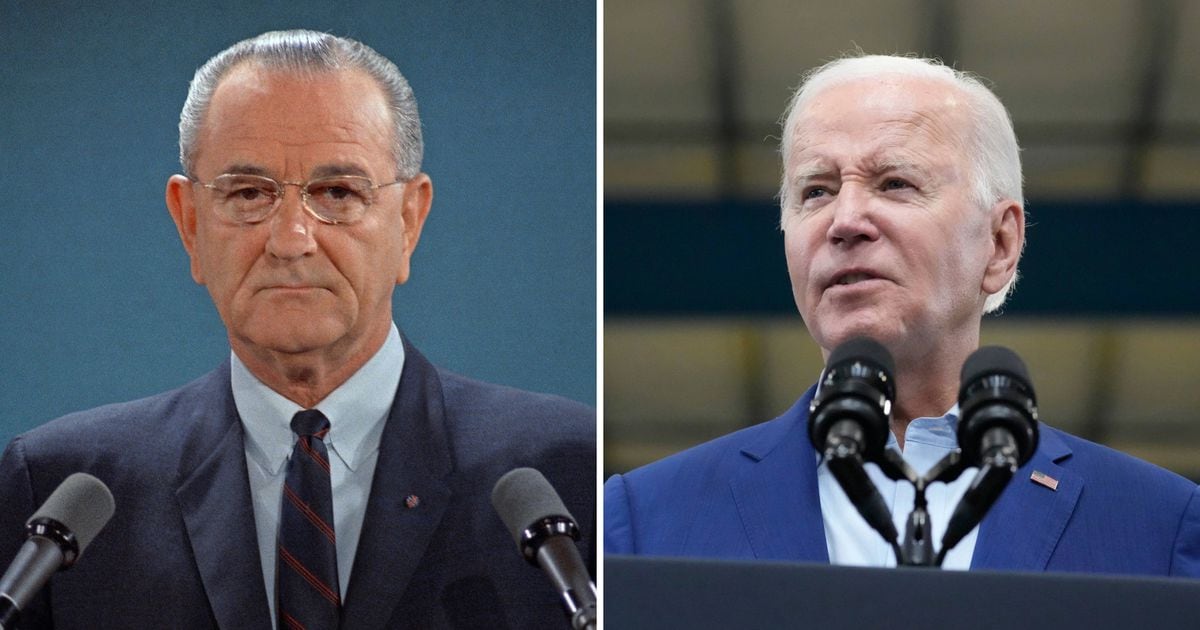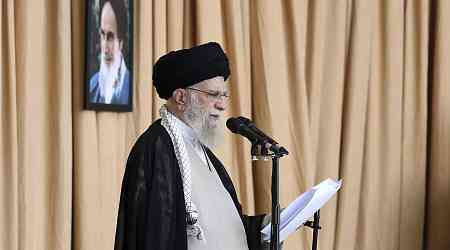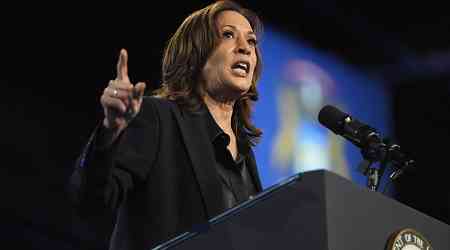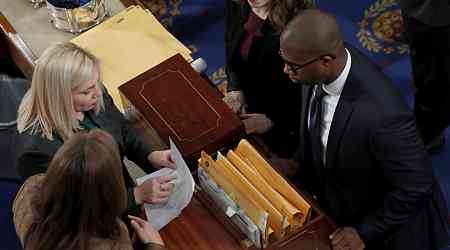The president was unpopular. He was enmeshed in a divisive foreign conflict he insisted on supporting despite ever-louder murmuring in the media. Prominent critics from within his own party were calling on him to step down. Inflation was rising. And the opposition party, the Republicans, were coalescing around a divisive retread; a presidential candidate who had recently lost an election and whose campaign was based on complaints about protesters marching in the streets and promises to restore law and order.
Two presidents
It was, of course, not 2024 but 1968. Lyndon Johnson had taken over the presidency after John F. Kennedy’s assassination in 1963 and won the office in his own right in 1964. The Republicans were routed in that election. The Democrats had large majorities in both houses of Congress. Johnson had the wind at his sails as no president since Franklin Roosevelt.
In the early 2020s, Democrat Joe Biden seemed in a similar situation. His party controlled Congress. Donald Trump’s approval rating plummeted in the wake of the Jan. 6 riot the Republican incumbent’s supporters staged at the Capitol.Both Johnson and Biden ushered landmark legislation through Congress. Johnson passed the Civil Rights Act and the Voting Rights Act, banning segregation by race in the United States and in its elections. He created Medicare and Medicaid and established a federal student loan program.
Over the four years of his presidency, Biden has shepherded through Congress similar historic investments in infrastructure, including a massive boost to science and manufacturing, hoping to ensure that future computer parts will be built in the United States rather than China. The Inflation Reduction Act of 2022 is the largest step the United States has ever taken to counter climate change. Estimates suggest that, because of its measures, by 2030 U.S. carbon emissions will drop to as little as 43% of where they were in 2005.
And yet, by the time their reelection years rolled around, both presidents were deeply unpopular.
In addition to his legislative achievements, Johnson was grimly determined to, as he put it, avoid becoming the first American president to lose a war. So he kept plowing the nation’s money and its soldiers into an attempt to win a brutal guerrilla struggle with a communist insurgency in Vietnam. In the way of most such uprisings, though, this insurgency proved impossible to defeat. Its strength did not lie in a coherently organized army one could target on the battlefield, but in grassroots support and widespread Vietnamese resentment of a century of American and European occupation of their country. American casualties piled up. Some 17,000 U.S. soldiers died in 1968 alone.
Similarly, Biden’s commitment to supporting the Israeli incursions into Gaza has begun to wear on Americans. Most Americans agree that Israel has the right to defend itself against violent attacks like those of Oct. 7, 2023, but Israel’s leadership appears comfortable with causing tens of thousands of civilian deaths in its pursuit of the militant group Hamas — ignoring calls from across the international community for greater restraint.
Johnson insisted that he could have both guns and butter; he could start generous social programs and wage a foreign war. But, by 1968, inflation was spiking, partly because of Johnson’s programs and partly because manufacturing in Europe and Japan was catching up to U.S. prowess and putting pressure on American businesses.
Similarly, in 2024, prices remain peskily high, though inflation is down from its peak in 2021 and 2022. Most economists blame this inflation only in part on Biden’s programs. The bulk instead derives from kinks in the global economy — supply chains disrupted by COVID-19 and turbulence in Ukraine and the Middle East.
By the time primary season rolled around for both presidents, then, their respective popularity was badly bruised. By mid-1968, a majority of Americans expressed deep disapproval of the Vietnam War. Biden’s approval rating (as measured by the media company 538.com) has not crossed 40% since 2023.
The 1968 debacle

Johnson seemed convinced that he would win reelection anyway. Few Democrats were willing to challenge him. Johnson did not bother entering the first primary, held in New Hampshire in mid-March 1968. But when a largely unknown senator from Minnesota, Eugene McCarthy, mounted a fiery challenge based entirely on opposition to the Vietnam War, Johnson’s supporters hastily organized an impromptu write-in campaign of their own.
McCarthy nearly won.
That shocker was followed by another. Right after the primary, Robert F. Kennedy, a senator from New York and brother of the slain JFK, announced he would also run against Johnson and began entering primaries to prove his popularity.
By month’s end, Johnson announced he would withdraw from the race.
This caused less turbulence than Americans today might think. At this point in U.S. history, presidential nominees were chosen by delegates to their party conventions.
Beginning in the 1970s, though, state governments and the national parties began to set the expectation that convention delegates must abide by the results of primaries and state caucuses. So today, conventions are symbolic coronations. Presidential nominees are known well in advance, simply by tracking the results of primaries.
That was not the case in 1968 or for any presidential election to that point. Delegates to conventions were normally picked by state parties. They were officeholders and party officials, and they voted as they wished.
In the summer of 1968, when the Democratic National Convention took place in Chicago, frustration with the system boiled over.
Throughout the spring, McCarthy and Kennedy battled in primary after primary, desperately trying to prove that they could win the November election. But those primaries meant little. Most party delegates were loyal to the party leadership in their state, and that party leadership was loyal to the president.
By the time the convention rolled around in August, McCarthy seemed the last man standing. Kennedy had been assassinated in June after winning the California primary. But McCarthy had still won more primaries than anyone, including the slain senator. He swept into Chicago on a wave of activist optimism.
And the convention promptly nominated … Hubert Humphrey, Johnson’s vice president, who had entered no primaries.
Many Democrats were furious. For nearly all the campaign that followed, Humphrey stuck to Johnson’s position on the Vietnam War. He lost to Richard Nixon, the Republicans’ failed presidential candidate from 1960, whom many Democrats viewed (not incorrectly) as a ruthless and corrupt partisan.
Soon after Humphrey’s defeat, Democrats began campaigning to reform the nominating process. They insisted it must become more democratic; that the party and candidates needed to be responsible to the people.
Lessons from Chicago

On the face of it, that idea sounds good. It’s easy to romanticize McCarthy and the activists who drove his campaign and to demonize Humphrey and the party mechanism that ensured his nomination. And it’s definitely true that throughout U.S. history parties have been vehicles for patronage and corruption.
But as with so much else in American history, there are no single clean answers. By the 1980s, the nominating processes were reformed. Delegates today are now, for the most part, required to vote for the winners of primaries and caucuses in their state.
Unfortunately, the flip side of this seeming win for democracy is that the growing weight of primaries has crushed the guardrails parties built. As primaries were strengthened, so were politicians who could win them. And the ability of party leadership to block nominees they feared or enforce their will has faded.
Parties historically were cautious and careful. Their leaders tried to promote the virtues of loyalty, competence and an image of respectability. They feared radicals and firebrands.
But it is often the virtues of radicals and firebrands — popularity, charisma, simple (even if untrue) messages — that prevail in primaries.
This two-sided blade is worth considering in 2024.
Had the Republican Party leadership had its way in 2016, Trump would never have been its choice. And Trump’s power in the party persists largely because of his grip on Republican primary voters, not because GOP leaders personally find him appealing.
At the same time, in 2008, the Democratic Party leadership almost certainly would have squelched the candidacy of Barack Obama and handed the nomination to Hillary Clinton.
Today, as calls mount for Biden to step aside after a debate performance both torpid and concerning, Democrats have no way to act even if party leaders would like to do so. The vast bulk of the delegates who will attend the Democratic National Convention in August of this year are bound to vote for Biden, often by law as well as party regulations.
Perhaps the two conventions this summer might inspire Americans to think again about what use parties might be and whether they might be reformed yet again. There is, of course, probably no perfect balance that would ensure the nomination of judicious and competent and yet popular and celebrated figures. But perhaps the parties should try.
The Democrats, after all, are meeting in Chicago.

Matthew Bowman is the Howard W. Hunter Chair of Mormon Studies at Claremont Graduate University and the author of 2023′s “The Abduction of Betty and Barney Hill: Alien Encounters, Civil Rights, and the New Age in America” and 2012′s “The Mormon People: The Making of an American Faith.”
The Salt Lake Tribune is committed to creating a space where Utahns can share ideas, perspectives and solutions that move our state forward. We rely on your insight to do this. Find out how to share your opinion here, and email us at voices@sltrib.com.






























